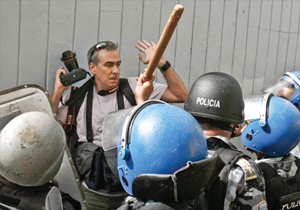
I hear it among my colleagues often – industry complaints. Some of my friends in newspaper journalism worry about the uncertainty of their jobs. Others in the magazine business object to their copy being squeezed by over-sized ads. Meanwhile, those of my associates in the electronic media whine about insufficient pensions to cover their expenses when they retire.
I wonder if any of them would ever complain again, if they knew the plight of Cameroon Express editor Bibi Ngota. Earlier this year, while imprisoned at Kondengui prison in Cameroon, he died of “abandonment (and) improper care,” according to official records.
Why was he in jail? According to a press release from the organization Canadian Journalists for Free Expression (CJFE), “(He) was charged with ‘imitating the signature of a member of government,’” short for criticizing the Cameroonian government.
Tonight, as you read these lines, I am attending an evening of tribute to Bibi Ngoto and four other international journalists being recognized with the 2010 CJFE International Press Freedom Awards. Hosting the evening is Carol Off, of CBC Radio’s “As It Happens.”
“The journalists we are honouring have bravely put their personal safety at risk to tell stories the world needs to hear,” Off said in a release.
Here, for the record, is some of what those four men have endured to speak out and/or write – with one eye cocked back over their shoulder.
Emilio Gutierrez Soto worked as a reporter for El Diario, a daily newspaper serving a small town in the U.S.-Mexico border state of Chihuahua. Given the strong presence of the drug trade and consequently the Mexican army in that part of his home country, Soto found he had to tread carefully through story content involving the military, the police and the cartels. According to CJFE documents, in February 2008, 700 soldiers moved across Chihuahua conducting a dragnet. One of Soto’s friends was shot down in the street.
“(They are) heavily armed commandos,” Soto dared to report.
That apparently offended the military. In the spring of the same year, 50 soldiers ransacked his home. So, in June, when he learned the soldiers planned to kill him, the single father gathered up his documents and his young son and fled to the U.S. He spent seven months in a customs detention centre; and even as he awaited a decision on his application for asylum, he continued to report on the plight of civilians under the banner “Mexican Journalists in Exile.”
Luis Horacio Najera’s story is not dissimilar. Over 10 years he wrote for a media group known as La Reforma, again in a hot spot along the Mexico-U.S. border. Even as he reported on the battles among rival drug cartels, he and his family endured intimidation and death threats by a criminal gang called “La Linea,” known for among other things, “putting the decapitated heads of their enemies on public display.”
Not unlike Soto, who is awaiting a ruling by U.S. immigration and Customs, in 2008, Najera fled to Canada where he awaits a refugee hearing by the Canadian government. In this country, he and his wife have turned to custodial work, but Najera still hopes to return to his work as a journalist one day. Meantime his case too is set to go before the refugee board.
“However, because the Canadian government considers Mexico to be a safe country,” the same CJFE report indicated, “93 per cent of Mexican refugee cases are rejected.”
Worse still is the plight of Serge Sabouang, Robert Mintya and Bibi Ngota, who attempted to write, edit and publish in the Cameroonian press. According to documents published by the CJFE, the three men were all arrested in February of this year for obtaining, but not publishing, a government document apparently accusing officials close to the president of “influence peddling and corruption.”
How many times – in the past month alone – have Canadian media levelled similar charges against corporate or political leaders? And what were the consequences? Silence at worst. Verbal rebuke at best. Mostly a refusal to comment. But never – as was Ngota’s fate – what the CJFE called “psychological and physical torture.”
“One of our (International Press Freedom) awards will be presented posthumously and two (to Sabouang and Mintya) in absentia,” Carol Off said in the release, “underscoring the high price these journalists have paid.”
So, whether you endorse the commentary on your favourite TV or radio newscast or not … or whether you dismiss the stories in your favourite daily newspaper as short-sighted or even biased or not, remember – as those of us who enjoy this writing privilege do – that press freedom can never be taken for granted.